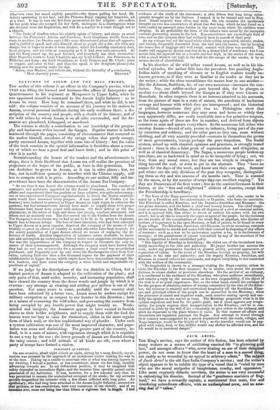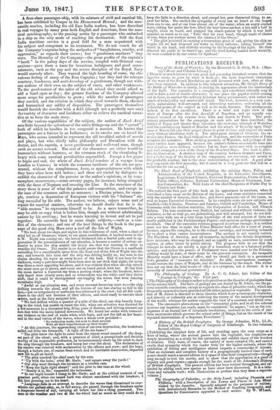JACK ARIEL.
THE King's service, says the author of this fiction, has been selected by many writers as a means of exhibiting nautical life "in glittering gold lace,' and amongst officers "who, never abating an ace of their delegated power, do not seem to know that the heart of a man is a sacred thing, not rashly to be wounded by an appeal to arbitrary edicts." The subject of Jack Ariel is the old East India Company's service ; and the writer's object appears to be to exhibit the type of a vessel that is "ruled by men who are the moral antipodes of haughtiness, cruelty, and oppression." Like most expressly didactic novelists, the writer is not very successful in embodying his theories. Instead of the "gentlemen mariners of Eng- land," we have a cowardly captain, a sentimental first mate, free and interfering subordinate officers, with an undisciplined crew, and an ama- zing deal of" talkee." A first-class passenger-ship, with its mixture of civil and nautical life, has been exhibited by Cooper in his Homeward Bound; and the mer- cantile marine, including the old East India traders, has been described in real voyages by many pens both English and American, from the nau- tical autobiography, to the passing notice by a passenger who embarked in a ship as the only mode of reaching his destination. Still the East India maritime service is a good field for a man acquainted with his subject and competent to its treatment. We do not vouch for all the Company's captains being the antipodes of" haughtiness, cruelty, and oppression," as regards their crews ; but "gentlemen mariners" they were. The liberality of the Company—the great profits of the captain's " berth " in the palmy days of the service, coupled with Oriental con- nexions—gave them a taste for luxurious indulgence and good enter- tainment, such as the pay and the severe discipline of the Royal Navy would scarcely allow. They wanted the high breeding of some the chi- valrous feeling of many of the Post Captains ; but they had the tolerant courtesy, frankness, and anti-humbug of a gentleman though not with- out notions of their own on the subject of caste, and other weaknesses. To the good-nature of the sailor of the old school they could afford to add a hand open as day ; the greater freedom of the Company allowed more scope for peculiarities to grow ; while the number of passengers they carried, and the relation in which they stood towards them, checked and humanized any oddity of disposition. The passengers themselves would furnish the novelist with a field (though not a perfectly new one) for variety of character and incidents either to relieve the nautical narra- tive or to form the main story.
Of the various capabilities of the subject, the author of Jack Arid sees little beyond the splendour of the cabin fittings-up and the "spread"; both of which he handles in too congenial a manner. He knows that passengers are a feature in an Indiaman ; so he carries one on board the Mars, who seems intended to represent the old invalided nabob of novels and plays, but who chiefly talks philosophy and liberalism with the doctor, and the captain, a most gentlemanly and well-read man, though such an arrant coward. The rest of the characters are either would-be humourists without humour, or the common stock of the circulating li- brary with some nautical peculiarities superadded. Except a few pages to begin and end, the whole of Jack Arid consists of a voyage from
London to Canton ; in which the common incidents of the sea are pre- sented, without the completeness, force, or appropriateness with which they have often been told before ; and these are varied by dialogues to exhibit the character of the persons or the author's opinions, or by com- monplace occurrences,—some seventy pages, for instance, being occupied
with the farce of Neptune and crossing the Line. In the structure of the story there is none of what the painters call composition, and except in the case of the common sailors no manners : a Persian prince, for exam- ple, receives a deputation of European visiters with his "Sultana" sit- ting unvcikd by his side. The author, we believe, enjoys some sort of
repute for nautical matters, otherwise we should doubt that be is the "able seaman" he represents himself to be. As a mere transcriber, he
may be able to copy what is before him, though not without adulterating nature by his writing; but he wants learning to invent and art to put together. Ile succeeds best in some single subjects,—such as a con- flict of the elements ; and one of the best things in the book is the pas-
sage of the good ship Mars over a reef off the Isle of Wight.
"We beat about two days and nights in this wilderness of mist, when a slant of wind led us off Dannose; where, to our great mortification, it backed more to the S. W. Night was coming on; the breeze freshened into a fearful gale; and in ag- gravation of the precariousness of our situation, it became a matter of serious ne- cessity to press the ship amidst the heavy sea that was running in order to weather the Owers. The reader is no doubt aware that the Owers is a sandbank extending for a considerable space from the East end of the Isle of Wight into the sea; and towards this fatal reef the ship was driving bodily on, the man in the chains shoaling his water at every heave of the lead. Had it not been for the darkness, many a pale face might have been seen on our deck that night; for never was there a more appalling lee-shore, and it was evident that when the ship struck she must soon go to pieces, and every one on board perish with her. At one time the moon darted a transient ray from a parting cloud; when the breakers, before only heard were clearly seen; and BO tremendous was the white surf they threw aloft, that it could be distinguished out-topping the waves that were running mountains high. * * * "Awful as our situation was, and every moment becoming more so,—the ship drifting towards the shoal, and all the horrors of our fate staring us full in the face,—yet no irregularity or confusion was witnessed in the crew; but all felt confi
i - dence n the skill and decision of their officers, and stood ready to execute their orders, each at the duty assigned him.
" Vie had drifted within a quarter of a mile of the shoal, our ship bravely keep- ing to the wind, but unable to resist the tide, when our attention was diverted for a few moments to a dismasted brig, firing guns of distress, and driving athwart our fore-foot with the union hoisted downwards. We heard her strike with tremend- OUB violence on the reef of rocks white with foam, and saw her fall on her beam- end in the mad vortex of the waves where a whole crew perished- . No reckoning made, but sent to their account
With all their imperfections on their heads.'
• "At this juncture, the approaching crisis of our own destruction, the boatswain Galled out from the forecastle A light off the lee-beam!' "The pilot knew the light come from the signal-vessel moored off the deep- est part of the shoal; and, with a presence of mind, a promptitude and decision worthy of his responsible profession, he instantaneously made up his mind to dash the ship through the breakers, and bump her over the shoal. The declaration of his resolve was received with acclamation by the officers and crew; and the hope, though a forlorn one of rescue from wreck and its inevitable destruction, imparted new life to all QC board.
The pilot touched the chief mate by the arm. "'Up with the helm,' cried Mr. Slade, and square away the yards! ' " Our ship went through the breakers at a temble rate. "'Keep the light right ahead!' said the pilot to the man at the wheel. "'Steady it is Sir,' responded the helmsman.
"In our rapid 'transit I clung to Mr. Slade; and at the critical moment of our greatest peril, when our tossed bark was almost smothered with the breakers, I felt him pressing me to his heart. "Language fails in an attempt to describe the waves that threatened to over- whelm our gallant ship, as, in full swoop, she passed through the breakers under a desperate crowd of sail, carrying all before her like a thing possessed. Two men at the weather and two at the lee-wheel had as much as they could do to keep the light in a direction ahead, and compel her, poor distracted thing, to an- swer her helm. She excited the sympathy of every one on board as she leaped from sea to sea, and at one time almost out of the water; when an angry-crested wave, taking her under the bow, lifted the best bower-anchor, a ton and a half in weight, clean on board, and snapped the shank-painter by which it was held asunder, as much as to say, 'Take that for your boast, though made of chains of iron, when you venture across the cataract of the Givers.' " The pilot persisted in carrying a tremendous press of sail, giving the ship no respite till we had deepened our water to thirty fathoms; taking himself the wheel in his hand, and skilfully steering by the bearings of the light. He then directed the yards to be braced up; and the wind having hauled more westerly, we were enabled to lie our course for Spithead."



























 Previous page
Previous page